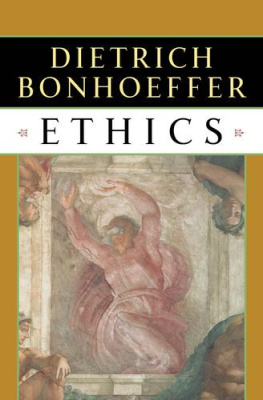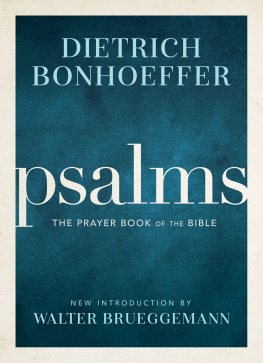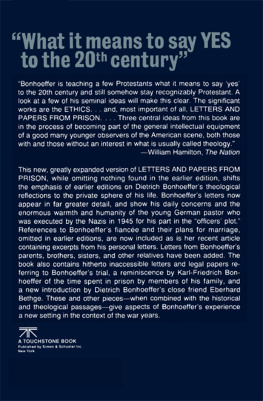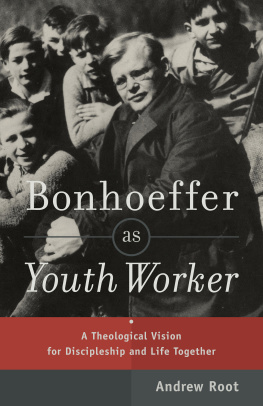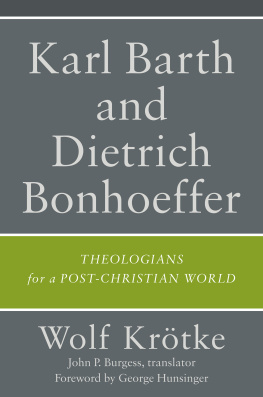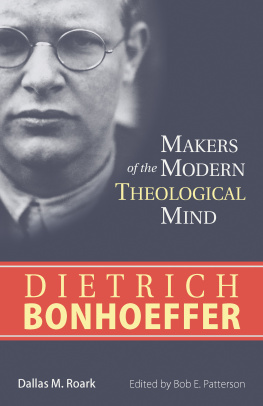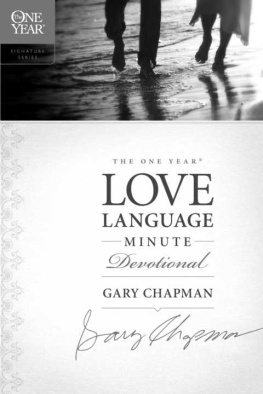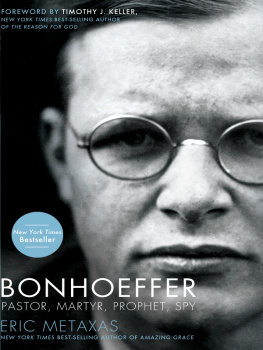Dietrich Bonhoeffer - The cost of Discipleship
Here you can read online Dietrich Bonhoeffer - The cost of Discipleship full text of the book (entire story) in english for free. Download pdf and epub, get meaning, cover and reviews about this ebook. year: 2012, publisher: Touchstone, genre: Religion. Description of the work, (preface) as well as reviews are available. Best literature library LitArk.com created for fans of good reading and offers a wide selection of genres:
Romance novel
Science fiction
Adventure
Detective
Science
History
Home and family
Prose
Art
Politics
Computer
Non-fiction
Religion
Business
Children
Humor
Choose a favorite category and find really read worthwhile books. Enjoy immersion in the world of imagination, feel the emotions of the characters or learn something new for yourself, make an fascinating discovery.
- Book:The cost of Discipleship
- Author:
- Publisher:Touchstone
- Genre:
- Year:2012
- Rating:4 / 5
- Favourites:Add to favourites
- Your mark:
- 80
- 1
- 2
- 3
- 4
- 5
The cost of Discipleship: summary, description and annotation
We offer to read an annotation, description, summary or preface (depends on what the author of the book "The cost of Discipleship" wrote himself). If you haven't found the necessary information about the book — write in the comments, we will try to find it.
The cost of Discipleship — read online for free the complete book (whole text) full work
Below is the text of the book, divided by pages. System saving the place of the last page read, allows you to conveniently read the book "The cost of Discipleship" online for free, without having to search again every time where you left off. Put a bookmark, and you can go to the page where you finished reading at any time.
Font size:
Interval:
Bookmark:
Thank you for downloading this Simon & Schuster ebook.
Get a FREE ebook when you join our mailing list. Plus, get updates on new releases, deals, recommended reads, and more from Simon & Schuster. Click below to sign up and see terms and conditions.
CLICK HERE TO SIGN UP
Already a subscriber? Provide your email again so we can register this ebook and send you more of what you like to read. You will continue to receive exclusive offers in your inbox.

I N THE SUMMER of 1988 a friend handed me this book (minus this foreword, of course) and asked whether I had ever heard of Dietrich Bonhoeffer. I was on something of a spiritual search at that time and my friend obviously thought this book might provide some encouragement and guidance. I confessed that I had never heard of Bonhoeffer. Who was he, I wondered, besides the author of the book I was now holding?
My friend knew of my German background and told me that Bonhoeffer lived in Germany during the Third Reich. Because of Bonhoeffers Christian faith he valiantly spoke out against Hitler, hardly something many were doing in Germany then. In fact, because of Bonhoeffers conviction that a true Christian must help those who are sufferingand for him this was principally the Jews of Germanyhe eventually became involved in the resistance to Hitler, and then even in an assassination plot against him. This was not the typical path we would expect from a man of God, but I soon learned there was nothing typical about Dietrich Bonhoeffer. My friend also told me that Bonhoeffer was imprisoned and eventually murdered by the Nazis, just three weeks before the end of the war.
I was somewhat embarrassed not to know of this extraordinary figure. That a German Christian had publicly defended the Jews and was murdered for doing so was, for me, not less than astonishing. Even given my own skepticism toward Christianity at that time, I had to admit that this was the sort of Christian in whom I might be interested.
But for me the subject of the Nazis was also a deeply personal one. My mother grew up in Germany during the Third Reich. I knew that my grandfather, for whom I was named, had dared to listen to the BBC in the evenings, with his ear pressed against the radios speaker, lest anyone discover what he was doing, since such things could land one in a concentration camp. But my grandfathers dislike of Hitler could not prevent him from being forced to serve in the army. He was killed on his way to the Russian front in April 1944, aged thirty-one when my mother was just ten. Her life was haunted by the agonies of those bitter years; and I couldnt help but think that Bonhoeffer was also a voice for many Germans, too, who dared not speak out themselves.
My friendhis name is Ed Tuttlealso told me that Bonhoeffer had come to America twice, the second time in the summer of 1939, hoping to escape serving in Hitlers army. But then Bonhoeffer had gone back, despite the obvious danger to his life. When the Nazis executed him, he was thirty-nine years old and engaged to be married. Who could fail to be fascinated by the life of such a brilliant and brave man?
And so I began reading this book. In the first line of the foreword of that edition, Bishop George Bell quotes something from Bonhoeffer that is at the heart of this bookand at the heart of all Bonhoeffers theology. It is as bracing a sentence as one may encounter: When Christ calls a man, he bids him come and die. If one wishes to recommend the Christian faith to someone, such a sentence might well be what one would avoid saying at all costs. But when Bonhoeffer wrote those words he had long since passed beyond niceties and bromides. He was a man of truth in word and deed, a man who would live out what he had written. So I was hooked immediately. Whom had I ever read who wrote anything that was at once so blunt and off-putting, and yet so heartbreakingly beautiful and good and true? The sentence becomes that much more haunting in light of Bonhoeffers death eight years later. As I read the rest of this book, my life was forever changed. It was unlike anything Id read before. Indeed, it was a revelation.
I wanted to know more about the man behind the words, but at that time there was no popular-level biography of Bonhoeffernor did I dream that twenty years in the future I would write one myself. So for a time I was forced to content myself with the most basic details of his life. But when at last I did write my own book, I discovered that his upbringing and his life are themselves fascinating and go a long way toward explaining how he came to write a book like this one.
To begin with, Dietrich Bonhoeffer was a genius. He was born in 1906 into a celebrated family of similarly brilliant figures. Bonhoeffers father was the most famous psychiatrist in Germany and for decades ranked among the most renowned scientists of Europe. One of Dietrichs brothers was a physicist who split atoms with Einstein, while another rose to become the legal head of Lufthansa. Dietrich was among the youngest of eight brothers and sisters, whose vibrant company dramatically honed the young Dietrichs skills as a rigorous thinker. For the whole family, anything like the sloppiness of clichs was an embarrassment and an anathema. In the Bonhoeffer home one was taught to know what one thought and never to speak unless one had something to say, and then to say it precisely and well. But it was hardly a harsh environment. The family reveled in literature and art and sports, and even had a musical night once a week, to which friends were invited. Reading of his early years cannot help make anyone somewhat jealous, because a better environment in which to be raised can hardly be imagined.
But then during the Great War Dietrichs seventeen-year-old brother Walter was killed on the Eastern Front. This tragic news, as Dietrich was turning twelve, seemed to catapult him from his idyllic childhood into a sudden maturity. He was always thinking about the biggest questions, about God and eternity, but in his thirteenth year he decided he would do this for the rest of his life by becoming a theologian, though it took him a full year to admit this decision to the rest of his family. He knew that his scientifically minded brothers and father would not be pleased with this choice; but when they chided him for joining an institution as flawed as the church, he resolutely shot back, Then I shall reform it! Little did he know how much truth there was in this youthful boast.
Bonhoeffers maternal great-grandfather was a nationally distinguished theologian, and his mothers father and brother both were pastors, so his choice of profession was not as wild a departure for him as his brothers made it out to be. At seventeen Bonhoeffer entered Tbingen University and then returned to Berlin, where, studying under such living legends as Adolf von Harnack, he earned his doctorate in theology at the astonishing age of twenty-one.
The subject of his dissertation was the question What is the Church?, which he answered with such academic luminosity that the finest theological minds of the era were astonished. No less than Karl Barth declared it a theological miracle. Even so, Bonhoeffer did not wish to limit himself to academia. It was his ambition also to be ordained as a Lutheran pastor. He wanted not only to think about God in a university setting but also to serve Him in an ecclesiastical one.
Bonhoeffer believed that if one could not translate ones theological ideas from the academic realm down to the layman in the pewand not just to him but to his childrenperhaps one did not understand much at all or have much to say. And beyond this, Bonhoeffer believed that whatever one said one believed was not as important as living what one believed. If you werent living it, did you really believe it? So taking his theology to real people, and not just to be understood but to be lived out as disciples of Christ, was for him paramount. This is of course what led him to write this book, published in 1937, whose German title, Nachfolge , simply translated, is discipleship, but which literally means to follow after. Whom one is to follow is implicit.
Next pageFont size:
Interval:
Bookmark:
Similar books «The cost of Discipleship»
Look at similar books to The cost of Discipleship. We have selected literature similar in name and meaning in the hope of providing readers with more options to find new, interesting, not yet read works.
Discussion, reviews of the book The cost of Discipleship and just readers' own opinions. Leave your comments, write what you think about the work, its meaning or the main characters. Specify what exactly you liked and what you didn't like, and why you think so.

